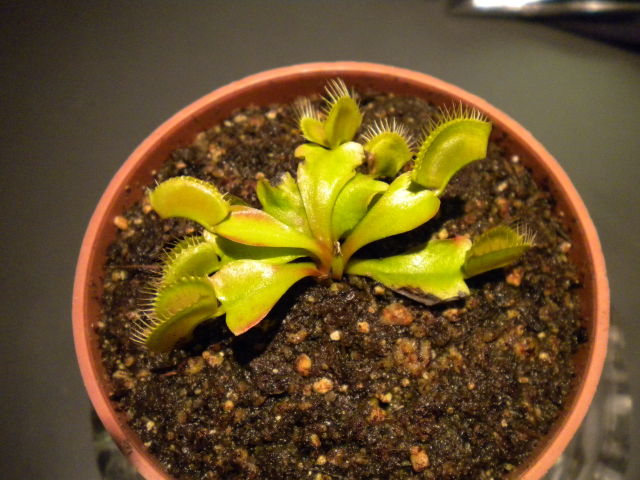Question
 Infected Dionaea
Infected Dionaea
1. Dionaea muscipula
2. All my Northern American plants have spider mites mostly concerned with Dionaea muscipula.
There is lots of fine webbings all around the plants some are marked with many small, light flecks, giving the plant a somewhat speckled appearance.
leaves are becoming discolored, producing a bronze look to the plant. New growth and some ends of the plants are scorched.
3. A)I grow them in full sun 6 to 8 hours or more of direct sunlight outside in my balcony.
B)I use distilled water
C)1part peat moss and 1part perlite
D)growing them for well over a year now.
4. Santa Ana Ca Zones 8 and 9
Note: I used some systemic insecticide called Orthene active ingredient (acephate )97.4 % and 2.6% of other ingredients.
Rose Rx 3 in 1Neem Oil RTU active ingredient (clarified hydrophobic extract of neem oil)0.9% and 99.1% of inert ingredients, by BONIFIDE multiple purpose Fungicide Insecticide and Miticide, For organic gardening , water based
Note: I applied both of these in the afternoon, a few pellets of Orthane and Neem Oil only on top of the dionaea mucsipula. I learned that spider mites live in the underside of leafs but before I get more carried away I need your guy抯 advise I抦 really scared for my plants I think I poisoned them too. Help!
Kind concerns Jose E Bastida.
AnswerThank you for supplying all that information. It helps me out a lot. Spider mites tend to infect plants in warm dry climates, so it's no surprise that they're showing up on your plants. If left unchecked, the mites can drain your plants of vital juices.
The insecticides you're using is appropriate for treating spider mites and are safe to use on carnivorous plants. Always follow the directions on the bottle. Keep in mind that if you're afraid that you're poisoning your plants with these products, the worse alternative is not treating the plants and allowing your plants to die from spider mites. Orthene and Neem are both safe for carnivorous plants when used as directed.
With that said, I haven't found Orthene to be effective in treating spider mites. Instead, I found pyrmethrin and Neem to be most effective. Since they are not systemics like Orthene, you will need to spray your plants regularly, such as weekly, until the infestation is eradicated. Make sure to spray under the leaves since that is where spider mites like to live.
I also recommend using a spray bottle to spray your plants with distilled water daily. Drench the plants with water since spider mites hate moisture. Do this daily until you are confident that you eradicated nearly all of the mites. After that, you can probably drop decrease the spraying to 1-3 times weekly. Some growers have also resorted to dunking their plants, pot and all, in a bucket of water for 15-20 minutes. This will also kill off spider mites.
But the issue is prevention, so regular spraying with water or dunking is the best form of prevention in dry climates. Use pyrmethrin or Neem if the infestation gets out of control again.
For more information about using insecticides, watch our video podcast on the subject:
http://www.youtube.com/watch?v=lbRCdJ8ZNF0
Good growing!
Jacob Farin






